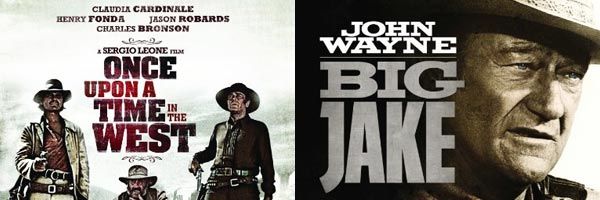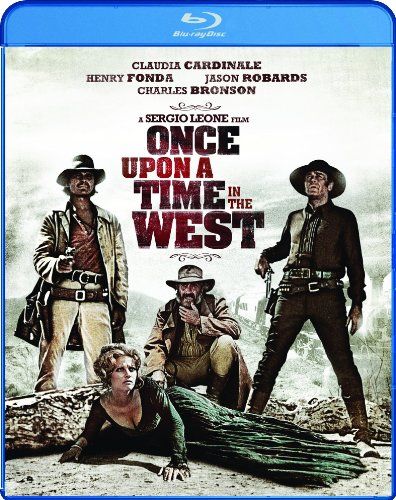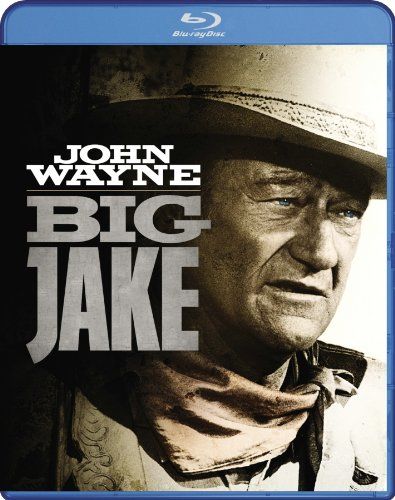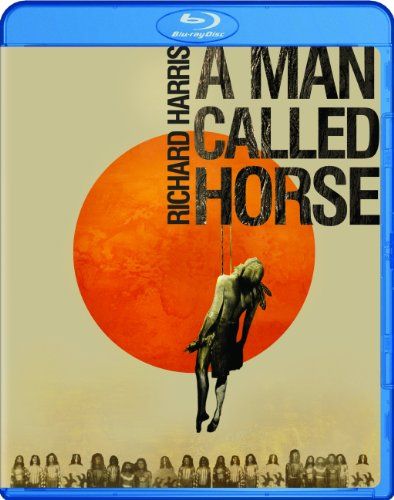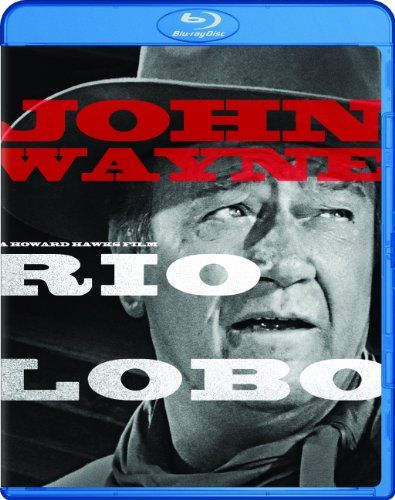The great thing about a hit film hitting DVD or Blu-ray is that often you’ll get tied in releases of similar (and usually older) titles. Perhaps Paramount would have eventually gotten to A Man Called Horse, Rio Lobo, Big Jake and Once Upon a Time in the West on Blu-ray. But it seems the release of the Coen Brothers version of True Grit has expedited the process. There’s at least one masterpiece in this pile, and two solid entries at least. Our reviews of all four follow after the jump.
Let’s start with the masterpiece. Once Upon a Time in the West is one of the great westerns, and the summation of Sergio Leone’s western work. Though it’s hard to argue that The Good, The Bad and the Ugly isn’t equally good, Leone was able to integrate the mythology of the West in a stronger fashion here Where in Good, that it takes place during the civil war is like a cosmic joke for its protagonists, here Leone embraces the ideas of the end of the West, the nature of urbanization, and the sense of men out of time and place in ways that he didn’t before. But also doing so in this epic canvas.
The film opens in one of the great opening sequences. Three gunmen wait for someone to arrive. And wait. And wait. Eventually Harmonica (Charles Bronson) shows up, looking for Frank (Henry Fonda). Frank’s out killing a family, so Harmonica takes on the three by himself. He goes to a bar and meets Cheyenne (Jason Robards), who has been set up as the killer of the family. Claudia Cardinale plays Jill McBain, the wife of the recently deceased, and it’s revealed that her lat ehusband was preparing to build a town knowing the train would coming through their land. That’s why Frank killed the family – he works for the money men who are bringing the train across the country.
The film was conceived by Dario Argento, Bernardo Bertolucci, and Leone, and that’s a powerhouse of a creative team. What’s great about the film is that it’s very much as if outsiders tried to make the ultimate American western, but fro the casting of Fonda as the bad guy, they’re both working within the formula and messing with it. Leone’s action sequences are still breathtaking and clever, and he manages to work the three characters is interesting ways that riff on the trio in Good. He was also shooting in America for the first time, so it incorporates some of the touchstone backgrounds of the genre. This is a masterclass of filmmaking, and one of Ennio Morricone’s finest scores, along with Bronson’s best leading role. And the humor is excellent. It’s also super-quoteable. Basically it’s a perfect movie.
Paramount presents the film in widescreen (2.35:1) and the transfer is as good as one could hope for, there’s going to be grain, but the colors are perfect, and it looks right. The soundtrack is available in a spruced up 5.1 DTS-HD track and the original mono 2.0 track. The DTS remixing is subtle, and mostly gives a greater breadth to the score, but with a film this dubbed, messing with the audio isn’t problematic (Italians rarely shot with sync sound until the 90’s).
Everything on the disc is recycled except that this is the restored version, and there’s a theatrical cut (but not the American theatrical cut which butchered the film’s running time) and an extended version. The differences are marginal, and the running time for the theatrical is 165, and the extended 166. I watched the extended cut, and didn’t notice anything revelatory. The film comes with a commentary by Sir Christopher Frayling and Dr. Sheldon Hall, with additional thoughts from directors John Carpenter, John Milius & Alex Cox, Bernardo Bertolucci and finally Claudia Cardinale. The guest commentators chime in every once in a while, but Frayling is the Leone expert, and there’s good reasons to listen to this. Those listed above show up in the featurettes, “An Opera of Violence” (29min.) ”The Wages of Sin (20 min.) and “Something to Do with Death” (18 min.) These cover Leone, his working methods and the film itself. This is solid work, maybe a little puffy, but solid information all around. This feels definitive. Also included are “Railroad: Revolutionising the West” (6 min.), which is more historically based, “Locations Then & Now” (4 min.) and a “Production Gallery” (5 min.), which offers behind the scene stills set to Morricone’s score. Also included is the theatrical trailer.
Big Jake is a late stage John Wayne film. Wayne plays the titular Jake, and he’s entrusted (by Maureen O’Hara) to deliver a ransom. His nephew was kidnapped (by Richard Boone and company), and he’s the only man the family trusts. A very straightforward action film, there’s not much to it but for those who like watching Wayne in a western. I like most of the actors, but it’s just a routine programmer. There was nothing that sets it apart from a number of lesser Wayne cowboy movies. That can be satisfying in its way, but there’s not much here. The disc comes in widescreen (2.35:1) and in DTS-HD 5.1 surround. The transfer is excellent. But there are no supplements.
Better is A Man Called Horse. It too is widescreen (2.35:1) and in DTS-HD 5.1 surround, it also looks excellent and offers no supplements. The story of an Englishman (Richard Harris) who is taken in by Indians, this has long been called the proto-Dances with Wolves, and it’s true. As with the turning tide of public and Hollywood opinion toward Indians, the film is mostly respectful, but slightly exploitative of the Indian culture. Harris is the guide, and he goes from wanting to escaping to “going native” and even getting married. He leads them in some ways, using the innovations of his people, and the film is a fine adventure yarn. It’s a good role for Harris, and it tests him more psychically than mentally, but he’s a good anchor, and the film works. It’s just very dated.
Rio Lobo has the same tech specs, but it’s 1.78:1, but otherwise, the same DTS-HD 5.1 remaster. The picture quality is excellent, though in this stage of his career, Howard Hawks had more films that look liked television. But by the time Hawks made Rio Lobo he had directed over 40 films and was finally considered one of the great American directors. He was also 74 years old. And if the film lacks the best elements of his earlier pictures, it also has much of what makes Hawks so entertaining. The film stars John Wayne as Cord McNally, a Union officer who's supposed to watch a train carrying gold that gets hijacked by Confederate soldiers led by Jorge Rivero and Christopher Mitchum. Cord later captures the duo, but a good friend of Cord's died during the heist. He wants revenge — and not against the thieves, but rather the Union soldiers who sold Pierre and Tuscarora the information. After the war ends, Cord asks the two to provide any information on the whereabouts of the traitors, leading him to Rio Lobo. On the way, Cord teams up with both Rivero and Shasta Delaney (Jennifer O'Neill). And as it turns out, the man who was selling the Confederates information is now a land baron using the town's law to steal any land he wants.
Though not as directly a riff on another one of his films (as El Dorado is), Rio Lobo offers many familiar Hawksism: Rivero is nicknamed Frenchy, and he stumbles into the room of Amelita (future Paramount honcho Sherry Lansing), only to have her try to seduce him, which recalls moments in The Big Sleep and Rio Bravo. There's also just something in the way Hawks and longtime scripter Leigh Brackett named (and nicknamed) their characters that seems so distinctly Hawksian. For a final effort by a veteran, Rio Lobo moves well enough, although there are some noticeable negatives. The cast isn't as strong as Hawks' usual ensemble efforts: O'Neill and Rivero come across as the community-theater versions of Hawks leads, and it looks like a TV production with its back-lot locations and flat cinematography. Still, there are pleasures to be had.

